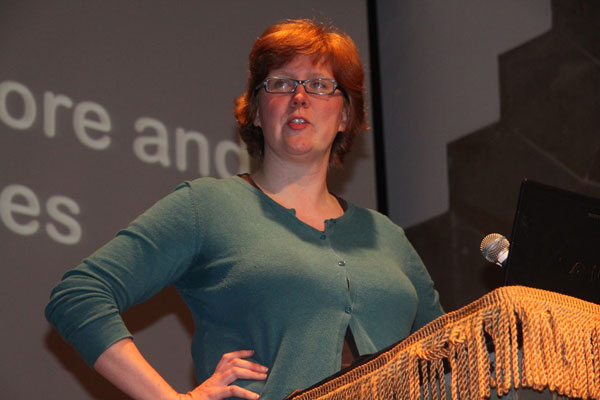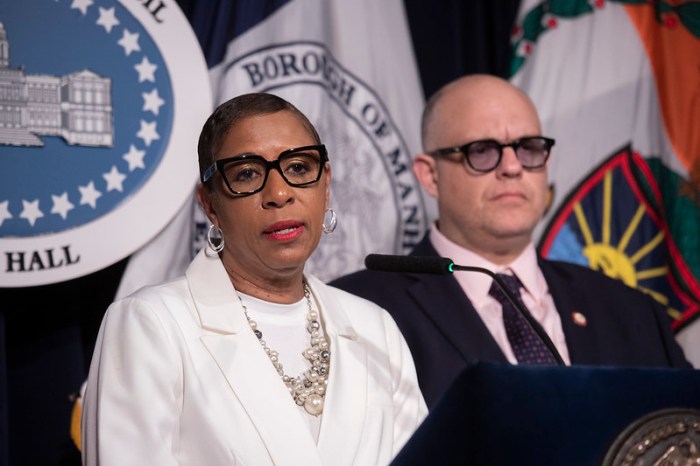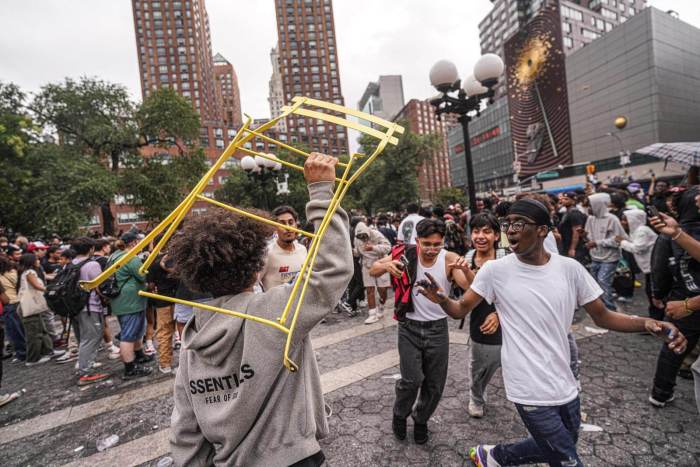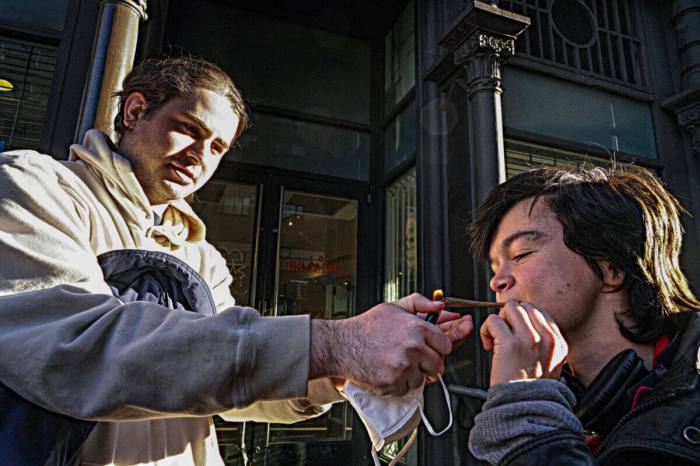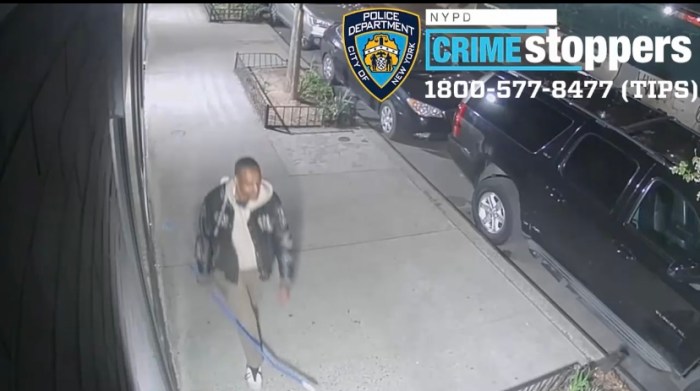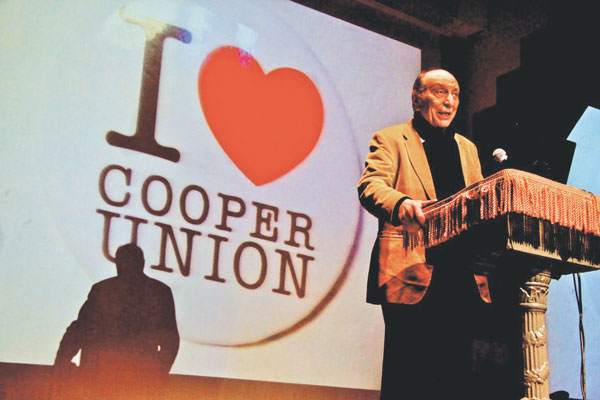 [/media-credit]
[/media-credit]
- Trustee Emeritus Milton Glaser, who designed the “I ♥ N Y” logo, was among the Cooper Union alumni who spoke at Monday night’s meeting.
BY AIDAN GARDINER | The financial crisis facing Cooper Union has some people lashing out in anger and others trying to find a calmer solution, but it seems like everyone in the school is determined to avoid charging tuition.
At the end of October, Cooper’s president, Jamshed Bharucha, announced that the school was considering charging tuition for the first time in roughly a century because a decade of financial difficulties had ballooned the school’s annual deficit to some $16 million. Many — both within the school and without — were shocked by the news because Cooper had long been lauded for its financial prudence.
Now, students, faculty and alumni are trying to both make sense of the problem and fix it without charging tuition because they see the free education Cooper provides as essential to the school’s success.
Doing their part, alumni hosted a forum at Cooper’s Great Hall on Monday. Some speakers pored over financial tables and others reaffirmed in impassioned written statements their commitment to what they see as the fundamental principles of Cooper Union.
“It’s not that Cooper Union holds up free education — but that free education holds up The Cooper Union,” said David Gersten, an architecture professor at the school and an alumnus.
Milton Glaser, a Cooper alumnus who famously designed the “I ♥ N Y” logo in the 1970s, briefly spoke.
“Thank you all for being here and demonstrating your affection and love for this school,” Glaser said. “I feel the same way.”
Unlike the community conversation with Cooper board Chairperson Mark Epstein at the Great Hall a month earlier, the three-hour alumni forum proceeded without incident, save for several hecklers who occasionally punctuated the otherwise calm discussion.
When Peter Cafiero, Cooper’s alumni association president, said that it wasn’t the time to look for fault in the past, but instead forward to a solution, Professor Roderick Knox repeatedly shouted, “Accountability!” before starting to leave. When another man in the audience loudly scolded Knox, the two briefly argued, but quickly stopped to allow Cafiero to continue.
Other speakers included Che Perez, a representative of the student government, school administrators and Professor Peter Buckley, who provided a historical context for the current predicament facing the school.
In Buckley’s view, administrators and trustees have adopted the same expansionist attitudes of other universities and that has endangered Cooper Union.
“Much of the administration of American higher education is concerned with public relations, and I think one thing we’ve done is join that tendency, rather than seeing what makes us unique,” Buckley said.
Kerry Carnahan, an alumna and one of the principal organizers of the forum, said she’d lost sleep recently because events at the school have demanded so much of her time. She works as a civil servant, but when she heard about Cooper Union’s troubles she felt that she had to help in some way because of her deep affection for her former college.
“We have a different relationship to this institution than someone who pays, say, $50,000 to go to Barnard,” Carnahan said. “This school represents a dream and you’re invited to participate in it. To see a price tag put on that is very frustrating.”
Kevin Slavin, an alumnus and adjunct professor, said that he hadn’t donated to Cooper because he didn’t feel the school was transparent enough about its finances. Slavin, who is also an entrepreneur, said that when he asked some accountants he works with to investigate Cooper’s finances, they told him, “We’ve never seen something this f—– up without being deliberately obstructive.”
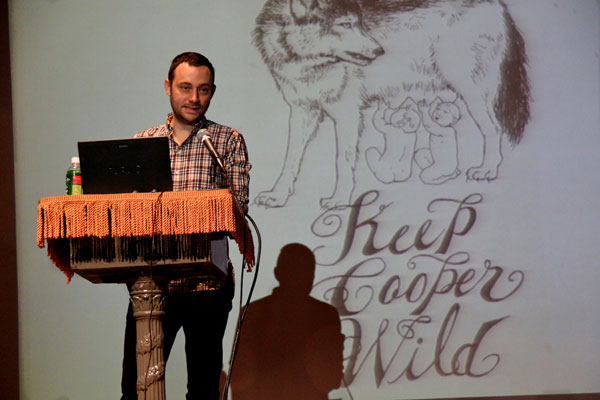 [/media-credit]
[/media-credit]
- Benjamin Degen, Cooper Union Class of ’98, spoke on “Affirmation of Core and Guiding Principles.” He’s an alumnus, his parents are alumni, he’s married to an alumna and he also teaches at Cooper Union.
Slavin also took issue with Epstein’s characterization of alumni who don’t donate as “failed investments.”
“Three days ago Cooper Union asked me for $10,000 and I brought that here tonight,” Slavin said as he took a check out of his back pocket. “To President Jamshed Bharucha and Chairman Mark Epstein, the money is on the table and we’ll see whose investment fails whom.”
Barry Drogin, a West Village resident and Cooper alumnus, has started up an online newsletter, The Alumni Pioneer, to keep the Cooper community abreast of developments.
Following Monday night’s meeting, The Alumni Pioneer reported, “In a surprise move, President Bharucha announced an address to the Cooper community in the Great Hall at noon on Tues., Dec. 13. This is three days before the board of directors was supposed to deliver an analysis of the consolidated financial statements to the Cooper community. The subject of the address has not been revealed.”
Jolene Travis, a Cooper Union spokesperson, said her understanding was that Bharucha’s address was “internal” — for faculty, students, administrators and alumni — and not open to the press or general public.
